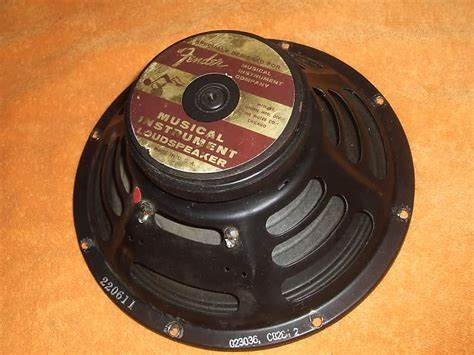Why Speakers Blow and How Do I Prevent it?
It's common to get amps in the shop that have a blown speaker or speaker (s) worn past the point of sounding good. Some customers are surprised when they blow a speaker, other blow speakers often, and have questions about why it happens. In this article I will explain some the major reasons speakers fail and how to prevent future failures.
Firstly, it's important to state that speakers tend to be robust and last a long time when used conservatively and are not exposed to harsh temperatures, moisture, dust or abuse by the user. Speakers fail for one of two reasons: firstly, they can overheat and damage the voice coil, second is physical damage to the cone or spider which can be interrelated with an overheating event. The former by far is most common issue and happens to new and old speakers but sometimes for different reasons. The latter is nearly always a product of old age.
Voice Coil Over-Heating
When the voice coil in a speaker overheats it will fail. This can happen for several reasons. Voice coils are rated a certain power level (I.e. 25W, 75W etc.) so, if the coil is given too much power from an amp it will over-heat. It also important to note that in a speaker the magnet of the speaker acts as heat sink so smaller magnet assemblies will not sink the heat as well as larger magnets. Failures at output powers far below the voice coil's rating can occur. There are many speakers on the market today that have rather liberal power handling ratings and cannot really handle the power they are rated for.
Distortion and high volume further exacerbate this overheating. This because square/distorted frequency waves cause the cone to not be able to return to the rest position. This condition builds heat. This is why players who play more distorted styles and play loudly have a greater tendency to blow speakers. They often can blow speakers that have high power ratings.
Effect of Cabinet Design on Power Handling of Speakers:
It should also be noted that open back and detuned ported cabs will have less power handling because the speakers are not impeded by the air inside the cab suspending the cone—-they run at maximum efficiency but run into their mechanical limits faster. Therefore, you should use speakers with higher power ratings on combos and open back cabs or just not play too loud. Closed backed cabs limit the cone’s movement decreasing efficiency and also allow more power handling. The trouble is that small closed-backed cabs sound lifeless—-bigger closed cabs sound better but overall, a ported cab will give you better tone with good low end and open back will give you good tone but with a reduced low end.
Aging affect Power Handling:
Age also degrades a speaker's ability to handle power. As the soft parts of the speaker stiffen or soften the change in the cone's travel degrades the power rating. Sometime a spider/voice coil will drop thus altering the rest position of the speaker. The spider can also become lopsided which can cause voice coil rubbing and/or weak volume. Spider problems will eventually lead to overheating but often the speaker will underperform for long time before that. This is one of the reasons old speakers are prone to blowing.
As parts dry up, soften, or harden the sound of the speaker changes from the original working sound of the speaker to a softer, less detailed, and more tired sound of a worn speaker. Eventually, the cone or surround can tear and develop holes. Voice coil rubbing (buzzing) can develop as well. I've seen speakers where the glue had dried up and the parts of the speaker were coming apart. Speakers that reach that state probably needed to be re-coned or replaced long ago. Speakers last much longer when kept in temperature-controlled conditions and away from dirt and dust. A speaker that is used regularly helps maintain the flexibility of the soft parts. An aged speaker with worn parts should be re-coned to prevent issues.
Preventing Over-Heating Events
To prevent overheating we recommend that you follow two rules: use speakers with adequate power rating and re-cone speakers if they have aged to the point where they can no longer to be trusted at stage volumes. For power handling a bare minimum of 150% of the amp's output is recommend and 200% is much safer. For players who play very loud and distorted 4 to 5 times the amps output rating is best.
Some players like the sound of old worn speaker but it's better to achieve it in other way rather than using speakers on the verge of failure. Most of the same players are happier with new speakers with smoother frequency responses. A properly re-coned a speaker can sound just as good as it sounded new and add decades of life to the speaker. The trick is finding the right person to re-cone an old speaker. It will sound different than a driver with many years of wear and tear on it but much closer to how it was intended to sound. Many sellers of vintage speakers put a lot of stock in “original cones”. Occasionally, you can get an old 50's,60's, 70’s or 80’s speaker that does have a good cone and spider, but it is far more usual for that those high dollar “working perfectly” speakers to need re-coning and become very expensive projects. There are tons of vintage amps out there right now that have dying speakers in them.
So, there you have it! With care you can prevent blown speakers and maintain great tone.

